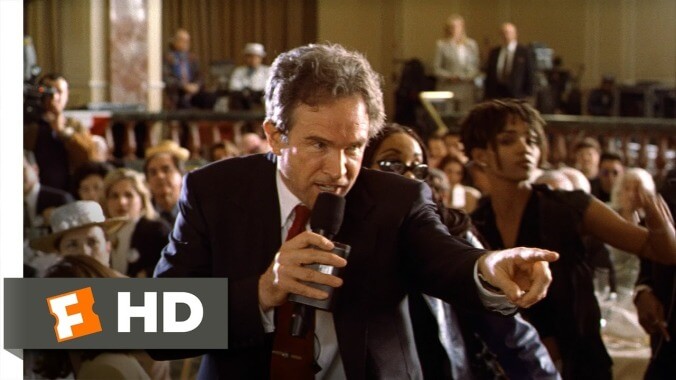Bulworth’s politics remain timely, even if Warren Beatty’s awful rapping doesn’t

Watch This offers movie recommendations inspired by new releases or premieres, or occasionally our own inscrutable whims. Because it’s 1998 Week here at The A.V. Club, we’re looking back at some of the movies of that bygone year.
Bulworth (1998)
When Warren Beatty made the political satire Bulworth in 1998, it wasn’t just some offbeat passion project for a mercurial artist. Well, it was, but the rest of the country was paying close attention, too, and in some surprising arenas. Sure, the New York Times magazine did a cover story on the writer, director, and star of the film, but you could also find Beatty in full hip-hop regalia on the cover of Hits magazine alongside RZA, Cappadonna, Pras, and Mack-10. Having recently turned 60, he was doing an unlikely full-court press for a movie that, at its heart, was a scathing indictment of the American political system and a plea for single-payer healthcare. Also, Beatty communicates solely in clunky rhyme for a good 50 percent of the running time. It’s an unusual film.
It’s also a messy film, but its lasting value lies more in its role as a snapshot of American politics in the mid-’90s, a time when the Democratic Party was busy kicking its working-class base (especially the black constituency) to the curb and refashioning itself, under the aegis of Bill Clinton, as the party of big business, welfare reform, and corporate-friendly globalization. (A more sympathetic view might argue that the Southern politician was dragging his party out of the ’70s and into the modern era.) Bulworth was a sneak attack on the establishment, a project for which Beatty had secured funding by pretending it was a romantic comedy. As the actor told the Times, he got 20th Century Fox on board by saying it was simply about a man who “pays someone to kill him, then falls in love and tries to call off the murder.” That part is true, but he left out how the man is a suicidal Democratic senator who then starts speaking extremely anti-corporate truth to power, adopts the dress and language of then-contemporary hip-hop, and begins an interracial romance with a young black activist (Halle Berry). Sadly, the last of those three elements might have been the most controversial at the time.
The final edit of the film doesn’t hold together terribly well. Essentially taking place over the course of 48 hours, the movie tracks the senator as he goes on a reelection campaign tour after hiring a contract killer to take him out, then proceeds to discard the slippery rhetoric of politics and delivers scornful raps about the collapse of democratic accountability at the hands of monied interests, the failings of the Democratic Party, the corrupt healthcare system, and the abandonment of black Americans by their elected leaders. Entire subplots appear to have been jettisoned or trimmed to the point of incomprehensibility. The racial politics in the film are clumsy at best. (Bulworth’s big idea to fix racism in the U.S. is miscegenation: “Everybody’s just got to keep fucking everybody until we’re all the same color.”) And the rapping—dear lord, there are few things more awkward than watching Warren Beatty attempt to freestyle rap about problems with corporate lobbyists.
Yet as a portrait of a progressive cry against the dismantling of the political left in America, Bulworth is indelible. The fantasy of a politician permitted to “tell it like it is”—and not only that, but to be rewarded for it—is a potent one. (President Obama himself would speak longingly to aides of “going Bulworth” during his second term.) More so, the film captures a particular strain of leftist hopes and frustrations, ones that have remained uncomfortably timely 20 years later. While the country has shifted profoundly to the right on everything from fiscal issues to gun laws to immigration (with only a few arenas, such as gay rights, that have moved into the mainstream from the left), the politically active left still struggles with issues that were internally fraying Democrats at the time. Bulworth indicts the corporate-controlled media and suggests public control of the airwaves, free and equal airtime for candidates, and no fundraising for politicians that then render them beholden to wealthy donors. An aging liberal democrat, Senator Bulworth’s big issue is a single-payer healthcare system. Sound familiar?
Writing at the time, the black legal scholar and intellectual Patricia J. Williams admitted she had gone to see the film three times: “I kept going back because I am amazed by a movie this overtly left wing, fearless and eccentric; or maybe I just went to hear the words ‘universal healthcare’ spoken out loud.” Many films have captured the dream of a noble politician riding a white horse through a field of mud to save us from ourselves (Robin Williams’ Man Of The Year is perhaps the most recent example of a genre that goes all the way back to Mr. Smith Goes To Washington), but few take place so unapologetically in our real world, or operate so forcefully like leftist agitprop. Bulworth isn’t great, but it captured a remarkable moment of political transformation in this country—and all the messy contradictions of progressive politics, cultural appropriation, and the ongoing struggle against wealth inequality look less satirical with each passing year. “Rich people have always stayed on top by dividing white people from colored people,” Bulworth says at one point. You can practically see Donald Trump on the sidelines, eagerly taking notes.
Availability: Bulworth is available to rent or purchase from the major streaming services. It can also be obtained on DVD from Netflix, Amazon, or possibly your local video store/library.